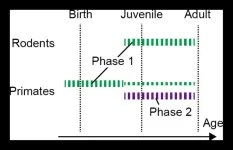(Press-News.org) Whether you like your eggs sunny-side up, hard boiled or scrambled, many hesitate to eat them amid concerns that eggs may raise cholesterol levels and be bad for heart health. However, results from a prospective, controlled trial presented at the American College of Cardiology’s Annual Scientific Session show that over a four-month period cholesterol levels were similar among people who ate fortified eggs most days of the week compared with those who didn’t eat eggs.
A total of 140 patients with or at high risk for cardiovascular disease were enrolled in the PROSPERITY trial, which aimed to assess the effects of eating 12 or more fortified eggs a week versus a non-egg diet (consuming less than two eggs a week) on HDL- and LDL-cholesterol, as well as other key markers of cardiovascular health over a four-month study period.
“We know that cardiovascular disease is, to some extent, mediated through risk factors like high blood pressure, high cholesterol and increased BMI and diabetes. Dietary patterns and habits can have a notable influence on these and there’s been a lot of conflicting information about whether or not eggs are safe to eat, especially for people who have or are at risk for heart disease,” said Nina Nouhravesh, MD, a research fellow at the Duke Clinical Research Institute in Durham, North Carolina, and the study’s lead author. “This is a small study, but it gives us reassurance that eating fortified eggs is OK with regard to lipid effects over four months, even among a more high-risk population.”
Eggs are a common and relatively inexpensive source of protein and dietary cholesterol. Nouhravesh and her team wanted to look specifically at fortified eggs as they contain less saturated fat and additional vitamins and minerals, such as iodine, vitamin D, selenium, vitamin B2, 5 and 12, and omega-3 fatty acids.
For this study, patients were randomly assigned to eat 12 fortified eggs a week (cooked in whatever manner they chose) or to eat fewer than two eggs of any kind (fortified or not) per week. All patients were 50 years of age or older (the average age was 66 years), half were female and 27% were Black. All patients had experienced one prior cardiovascular event or had two cardiovascular risk factors, such as high blood pressure, high cholesterol, increased BMI or diabetes. The co-primary endpoint was LDL and HDL cholesterol at four months. Secondary endpoints included lipid, cardiometabolic and inflammatory biomarkers and levels of vitamin and minerals.
Patients had in-person clinic visits at the start of the study and visits at one and four months to take vital signs and have bloodwork done. Phone check-ins occurred at two and three months and patients in the fortified egg group were asked about their weekly egg consumption. Those with low adherence were provided additional education materials.
Results showed a -0.64 mg/dL and a -3.14 mg/dL reduction in HDL-cholesterol (“good” cholesterol) and LDL cholesterol (“bad” cholesterol), respectively, in the fortified egg group. While these differences weren’t statistically significant, the researchers said the differences suggest that eating 12 fortified eggs each week had no adverse effect on blood cholesterol. In terms of secondary endpoints, researchers observed a numerical reduction in total cholesterol, LDL particle number, another lipid biomarker called apoB, high-sensitivity troponin (a marker of heart damage), and insulin resistance scores in the fortified egg group, while vitamin B increased.
“While this is a neutral study, we did not observe adverse effects on biomarkers of cardiovascular health and there were signals of potential benefits of eating fortified eggs that warrant further investigation in larger studies as they are more hypothesis generating here,” Nouhravesh said, explaining that subgroup analyses revealed numerical increases in HDL cholesterol and reductions in LDL cholesterol in patients 65 years or older and those with diabetes in the fortified egg group compared with those eating fewer than two eggs.
So why have eggs gotten a bad rap? Some of the confusion stems from the fact that egg yolks contain cholesterol. Experts said a more important consideration, especially in the context of these findings, might be what people are eating alongside their eggs, such as buttered toast, bacon and other processed meats, which are not heart healthy choices. As always, Nouhravesh said it’s a good idea for people with heart disease to talk with their doctor about a heart healthy diet.
This single-center study is limited by its small size and reliance on patients’ self-reporting of their egg consumption and other dietary patterns. It was also an unblinded study, which means patients knew what study group they were in, which can influence their health behaviors.
The study was funded by Eggland’s Best.
Nouhravesh will present the study, “Prospective Evaluation of Fortified Eggs Related to Improvement in the Biomarker Profile for Your Health: Primary Results from the PROSPERITY Trial,” on Saturday, April 6, 2024, at 12:45 p.m. ET / 16:45 UTC in Hall B4-5.
ACC.24 will take place April 6-8, 2024, in Atlanta, bringing together cardiologists and cardiovascular specialists from around the world to share the newest discoveries in treatment and prevention. Follow @ACCinTouch, @ACCMediaCenter and #ACC24 for the latest news from the meeting.
The American College of Cardiology (ACC) is the global leader in transforming cardiovascular care and improving heart health for all. As the preeminent source of professional medical education for the entire cardiovascular care team since 1949, ACC credentials cardiovascular professionals in over 140 countries who meet stringent qualifications and leads in the formation of health policy, standards and guidelines. Through its world-renowned family of JACC Journals, NCDR registries, ACC Accreditation Services, global network of Member Sections, CardioSmart patient resources and more, the College is committed to ensuring a world where science, knowledge and innovation optimize patient care and outcomes. Learn more at ACC.org.
END
Eggs may not be bad for your heart after all
Subgroup analyses signal a possible benefit among older adults and those with diabetes
2024-03-28
ELSE PRESS RELEASES FROM THIS DATE:
Alcohol raises heart disease risk, particularly among women
2024-03-28
Young to middle-aged women who reported drinking eight or more alcoholic beverages per week—more than one per day, on average—were significantly more likely to develop coronary heart disease compared with those who drank less, finds a study presented at the American College of Cardiology’s Annual Scientific Session. The risk was highest among both men and women who reported heavy episodic drinking, or “binge” drinking, and the link between alcohol and heart disease appears to be especially strong among women, according to the findings.
The study focused on 18- to 65-year-old ...
TTUHSC announces new center for nursing research
2024-03-28
The Texas Tech University Health Sciences Center (TTUHSC) School of Nursing announced March 27 the establishment of the TTUHSC Center for Nursing Research, Collaboration and Innovation.
“Interprofessional collaboration is essential for advancing research in health care,” TTUHSC School of Nursing Dean and Professor Holly Wei, Ph.D., said. “By bringing together professionals from various disciplines, we can harness a wide range of perspectives and skills to develop innovative solutions that significantly impact patient care and outcomes.”
For years, the TTUHSC School of Nursing has been recognized for its ability to educate ...
Adding just enough fuel to the fire
2024-03-28
How much fuel can we add to the fire while still maintaining control?
Metaphorically speaking, that’s the question one team at the U.S. Department of Energy’s Princeton Plasma Physics Laboratory (PPPL) has been asking themselves lately.
Now, they believe they have the answer for one particular scenario. It’s all a part of the Lab’s work to bring energy from fusion to the power grid.
Building upon recent findings showing the promise of coating the inner surface of the vessel containing a fusion plasma in liquid lithium, the researchers have determined the maximum density of uncharged, or neutral, particles at the edge of a plasma before the edge ...
Impact of synbiotic supplements on the gut microbiome and overall health of penguins
2024-03-28
A healthy gut plays an indispensable role in the absorption and metabolism of nutrients, maintaining immune function, and promoting general well-being. The profound impact of a healthy microbiome is not just limited to the gut, but there is mounting evidence that it influences almost every function of the body. Thus, the composition of the gut microbiome becomes an important indicator of health status of the body.
Probiotics are a type of supplements containing live strains of bacteria that improve and diversify the gut microbiome population. Lactiplantibacillus plantarum, a type of microorganism ...
Promising advances in organosilica membranes for separating organic liquid mixtures
2024-03-28
In many chemical-related industries, such as pharmaceuticals, oil refineries, and food and beverage factories, separating organic liquid mixtures is an essential step. A staple method to achieve this is distillation, which involves heating a mixture to a specific temperature so that only one of its components vaporizes. Though widely used, distillation fails to separate organic liquid mixtures in which both components have the same boiling point. Moreover, it’s an energy- and resource-intensive process, ...
Cell phone video technology unveils new method for analyzing walking and gait
2024-03-28
BALTIMORE, March 27, 2024— Researchers at Kennedy Krieger Institute and Johns Hopkins Medicine have developed a new, accessible approach to analyze a patient’s walking ability and stances more effectively. Following numerous tests, they determined that a simple video recorded on a personal pocket device, such as a smartphone or tablet, can be used to measure gait at a clinical, high-quality level.
Experts say current state-of-the-art approaches to gait analysis are often expensive and inaccessible due ...
Ancient isolation’s impact on modern ecology
2024-03-28
A new study led by Michigan State University researcher Peter Williams sheds light on the profound influence of deep geographic isolation on the evolution of mammals. Published in Nature Communications on March 28, the research reveals how long-lasting separation between continents has shaped distinct mammal communities around the globe.
“Today’s ecology was not inevitable. If there were different isolating factors long ago, we might have vastly different ecosystems today,” said Peter Williams, the lead author of the study. Williams is a research ...
Synaptic protein change during development offers clues on evolution and disease
2024-03-28
The first analysis of how synaptic proteins change during early development reveals differences between mice and marmosets but also what's different in individuals with autism spectrum disorders. The Kobe University findings offer first insights into the mechanism behind synaptic development and open up routes for research on possible treatments.
Given that synapses are the connections between our brain cells, one might think that having as many of these as possible is a good thing. However, primate brains do something unexpected: After early childhood, ...
How commercial rooftop solar power could bring affordable clean energy to low-income homes
2024-03-28
Lower-income communities across the United States have long been much slower to adopt solar power than their affluent neighbors, even when local and federal agencies offer tax breaks and other financial incentives.
But, commercial and industrial rooftops, such as those atop retail buildings and factories, offer a big opportunity to reduce what researchers call the “solar equity gap,” according to a new study, published in Nature Energy and led by researchers at Stanford University.
“The ...
Taking a closer look at pulmonary fibrosis genetics
2024-03-28
PHOENIX, Ariz. — March 28, 2024 — Regulators of gene expression are thought to play an outsized role in disorders from cancers to heart disease. But how exactly do variations in gene regulation translate into a disease’s biology?
A team of scientists led by researchers from the Translational Genomics Research Institute (TGen), part of the City of Hope, together with investigators at St. Vincent’s Institute of Medical Research and Vanderbilt University Medical Center, now have a better answer for this question when it comes to pulmonary fibrosis (PF), an incurable respiratory disease.
Their study, published today in Nature Genetics, is the first to look at these ...
LAST 30 PRESS RELEASES:
Increasing the number of coronary interventions in patients with acute myocardial infarction does not appear to reduce death rates
Tackling uplift resistance in tall infrastructures sustainably
Novel wireless origami-inspired smart cushioning device for safer logistics
Hidden genetic mismatch, which triples the risk of a life-threatening immune attack after cord blood transplantation
Physical function is a crucial predictor of survival after heart failure
Striking genomic architecture discovered in embryonic reproductive cells before they start developing into sperm and eggs
Screening improves early detection of colorectal cancer
New data on spontaneous coronary artery dissection (SCAD) – a common cause of heart attacks in younger women
How root growth is stimulated by nitrate: Researchers decipher signalling chain
Scientists reveal our best- and worst-case scenarios for a warming Antarctica
Cleaner fish show intelligence typical of mammals
AABNet and partners launch landmark guide on the conservation of African livestock genetic resources and sustainable breeding strategies
Produce hydrogen and oxygen simultaneously from a single atom! Achieve carbon neutrality with an 'All-in-one' single-atom water electrolysis catalyst
Sleep loss linked to higher atrial fibrillation risk in working-age adults
Visible light-driven deracemization of α-aryl ketones synergistically catalyzed by thiophenols and chiral phosphoric acid
Most AI bots lack basic safety disclosures, study finds
How competitive gaming on discord fosters social connections
CU Anschutz School of Medicine receives best ranking in NIH funding in 20 years
Mayo Clinic opens patient information office in Cayman Islands
Phonon lasers unlock ultrabroadband acoustic frequency combs
Babies with an increased likelihood of autism may struggle to settle into deep, restorative sleep, according to a new study from the University of East Anglia.
National Reactor Innovation Center opens Molten Salt Thermophysical Examination Capability at INL
International Progressive MS Alliance awards €6.9 million to three studies researching therapies to address common symptoms of progressive MS
Can your soil’s color predict its health?
Biochar nanomaterials could transform medicine, energy, and climate solutions
Turning waste into power: scientists convert discarded phone batteries and industrial lignin into high-performance sodium battery materials
PhD student maps mysterious upper atmosphere of Uranus for the first time
Idaho National Laboratory to accelerate nuclear energy deployment with NVIDIA AI through the Genesis Mission
Blood test could help guide treatment decisions in germ cell tumors
New ‘scimitar-crested’ Spinosaurus species discovered in the central Sahara
[Press-News.org] Eggs may not be bad for your heart after allSubgroup analyses signal a possible benefit among older adults and those with diabetes






